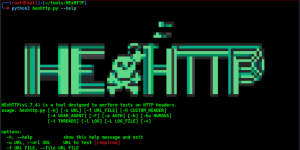Offensive Security Tool: Troll-A

Troll-A
Troll-A by crissyfield is a command line tool for extracting secrets such as passwords, API keys, and tokens from WARC (Web ARChive) files. Troll-A is an easy-to-use, comprehensive, and fast solution for finding secrets in web archives.
Features
- Protocols: Supports retrieving web archives directly from a network server via HTTP/HTTPS, from the Amazon S3 object storage service, or from the local file system.
- Compression: Supports web archives compressed with GZip, BZip2, or ZStd. For ZStd, it also supports custom dictionaries prepended to the compressed data stream (as used by *.megawarc.warc.zst files).
- Comprehensive: Uses the battle-tested ruleset from the Gitleaks project to detect up to 166 different types of secrets, tokens, keys, or other sensitive information.
- Performance: Works concurrently and optionally uses optimized regular expressions (via go-re2) to process a typical Common Crawl web archive (~34.000 pages) in less than 30 seconds on AWS c7g.12xlarge.
See Also: So you want to be a hacker?
Offensive Security and Ethical Hacking Course
Installation
Download
Troll-A is available in binary form for macOS and Linux on the releases page.
Building
For better performance, it is recommended to build Troll-A from source, as this allows to use optimized regular expression engine provided by go-re2. For this to work, the RE2 dependency must be installed first.
macOS
# Install dependencies
brew install re2
# Install with RE2 activated
go install -tags re2_cgo github.com/crissyfield/[email protected]
Debian / Ubuntu
# Install dependencies
sudo apt install -u build-essential libre2-dev
# Install with RE2 activated
go install -tags re2_cgo github.com/crissyfield/[email protected]
See Also: Offensive Security Tool: SQLMutant
Usage
Usage:
troll-a [flags] url
This tool allows to extract (potential) secrets such as passwords, API keys, and tokens
from WARC (Web ARChive) files. Extracted information is output as structured text org
JSON, which simplifies further processing of the data.
"url" can be either a regular HTTP or HTTPS reference ("https://domain/path"), an Amazon
S3 reference ("s3://bucket/path"), or a file path (either "file:///path" or simply
"path"). If the data is compressed with either GZip, BZip2, or ZStd it is automatically
decompressed. ZStd with a prepended custom dictionary (as used by "*.megawarc.warc.zstd")
is also handled transparently.
This tool uses rules from the Gitleaks project (https://gitleaks.io) to detect secrets.
Flags:
-e, --enclosed only report secrets that are enclosed within their context
-h, --help help for troll-a
-j, --jobs uint detect secrets with this many concurrent jobs (default 8)
-s, --json output detected secrets as JSON
-p, --preset rules-preset rules preset to use. This could be one of the following:
all: All known rules will be applied, which can
result in a significant amount of noise for
large data sets.
most: Most of the rules are applied, skipping the
biggest culprits for false positives.
secret: Only rules are applied that are most likely
to result in an actual leak of a secret.
No other values are allowed. (default secret)
-q, --quiet suppress success message(s)
-r, --retry retry-strategy retry strategy to use. This could be one of the following:
never: This strategy will fail after the first fetch
failure and will not attempt to retry.
constant: This strategy will attempt to retry up to 5
times, with a 5s delay after each attempt.
exponential: This strategy will attempt to retry for 15
minutes, with an exponentially increasing
delay after each attempt.
always: This strategy will attempt to retry forever,
with no delay at all after each attempt.
No other values are allowed. (default never)
-t, --timeout duration fetching timeout (does not apply to files) (default 30m0s)
-v, --version version for troll-a
Examples
Common Crawl
Common Crawl maintains a free, open repository of web crawl data that can be used by anyone. The Common Crawl corpus contains petabytes of data collected regularly since 2008.
For example, to extract secrets from all of the 3.35 billion pages of the November/December 2023 crawl (called CC-MAIN-2023-50), you can do this:
# Download the list of all 90.000 WARC paths
curl -sSL -O https://data.commoncrawl.org/crawl-data/CC-MAIN-2023-50/warc.paths.gz
# Iterate through all paths using 64 scanning jobs, output matches as JSON
gzcat warc.paths.gz | \
xargs -I{} -- troll-a -e -s -j64 https://data.commoncrawl.org/{} > secrets.json
This will take a long time! Depending on your hardware and Internet connection, this can take anywhere from a week to several months. You may want to run this example only for the first few lines of warc.paths.gz.
Internet Archive
The Archive Team is a group dedicated to digital preservation and web archiving founded in 2009. Web archives are stored as WARC files (more specifically, in MegaWARC format) and made available through the Internet Archive.
For example, to extract secrets from the 113.372 pages the Archive Team crawled from pastebin.com in April of 2023 (here’s the corresponding publication on the Internet Archive), you can do this:
# Call troll-a directly with the MegaWARC URL
troll-a -e https://archive.org/download/archiveteam_pastebin_20230421003309_a3b951b4/pastebin_20230421003309_a3b951b4.1603050931.megawarc.warc.zst
…which results in…










